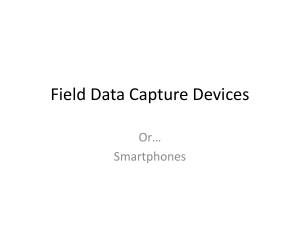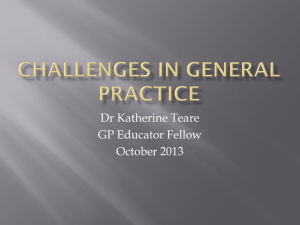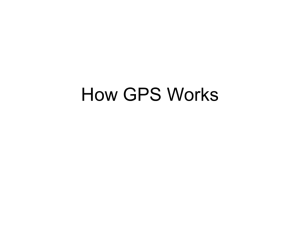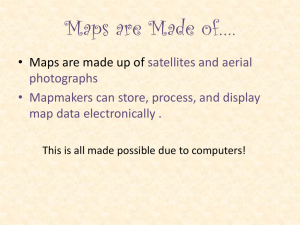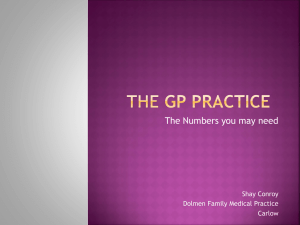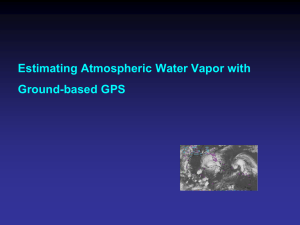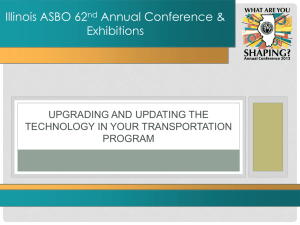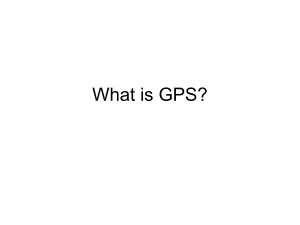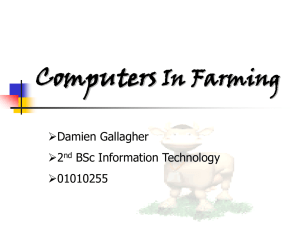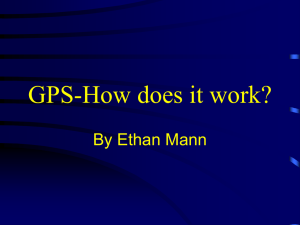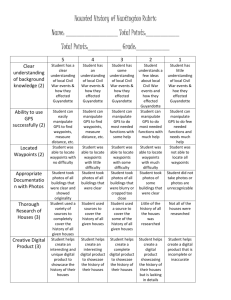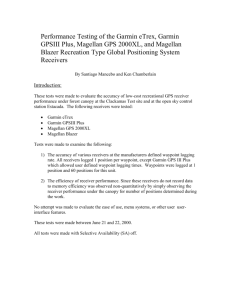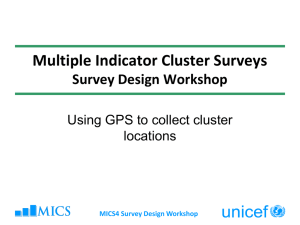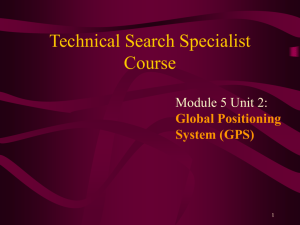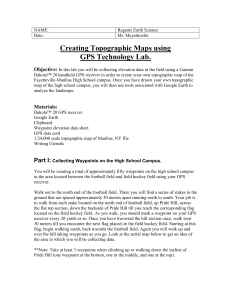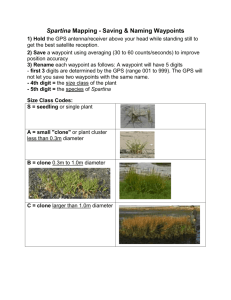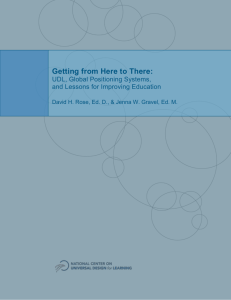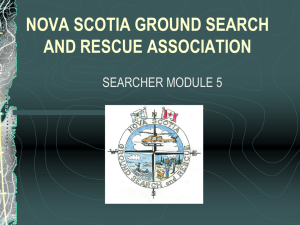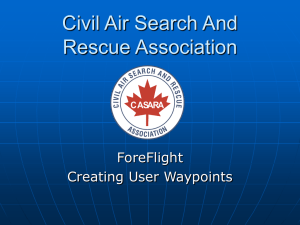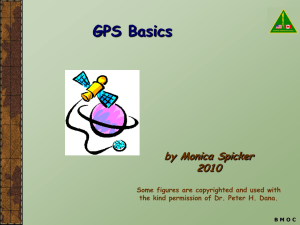see Ms. Gimble and Mr. Clark`s entire lesson plan
advertisement
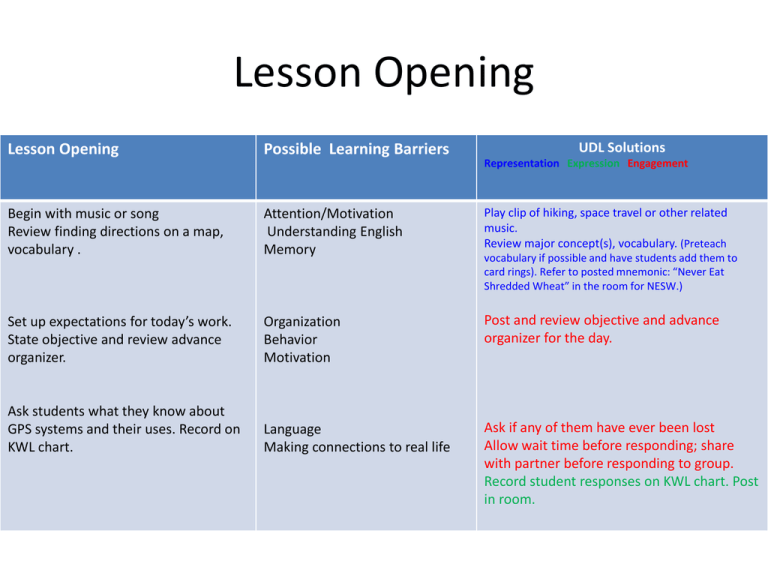
Lesson Opening UDL Solutions Lesson Opening Possible Learning Barriers Begin with music or song Review finding directions on a map, vocabulary . Attention/Motivation Understanding English Memory Play clip of hiking, space travel or other related music. Review major concept(s), vocabulary. (Preteach Set up expectations for today’s work. State objective and review advance organizer. Organization Behavior Motivation Post and review objective and advance organizer for the day. Ask students what they know about GPS systems and their uses. Record on KWL chart. Language Making connections to real life Ask if any of them have ever been lost Allow wait time before responding; share with partner before responding to group. Record student responses on KWL chart. Post in room. Representation Expression Engagement vocabulary if possible and have students add them to card rings). Refer to posted mnemonic: “Never Eat Shredded Wheat” in the room for NESW.) Teacher Input Teacher Input Possible Learner Barriers UDL Solutions Representation Expression Engagement Introduce the problem for today’s lesson: Hiker is lost, compass is broken, cloudy day. Mr. Longitude and Ms. Latitude come along with a GPS and use their coordinates to help her find her way. Show video clip on GPS systems Making connections Attention Motivation Language processing Hearing Comprehension Memory Low vision Role play lost hiker and add ‘anchors’ for longitude and latitude. Label props. Show short video and Power Pt. presentation on cardinal directions and GPS. Add closed caption. Need movement Attention Motivation Call on some students to locate points on the interactive whiteboard. Share plan to take them outdoors and add an element of surprise Language, Comprehension Work with a peer who can help translate, use words in context. Add pictures/symbols as needed. Need greater challenge Research satellites, GPS systems, WebQuest, plan for satellite construction design. Students may plan to create their own multimedia presentation/podcast. Some could plan this using a storyboard format. Encourage students to think of their own related research question. Review locating points on a map grid using longitude and latitude Tell students there are buried treasures (fossils) on the school property they can find using their GPS tool. Move half students to hall. Demonstrate finding points on large taped floor grid using satellites and yarn suspended from ceiling. Pull coordinate point cards from a bucket and locate. The other ½ will research satellites, GPS, review vocabulary if needed. Switch groups after 20 minutes. Need more review Project large grid on and practice using cardinal directions; include a map to help them make the connection Work on cardinal directions with handheld compass, Guided Practice Guided Practice Possible Learning Barriers Groups practice finding Comprehension waypoints and switch with Language partner. Trade large groups. Transition Try GPS outdoors with partner. Use present waypoints on soccer field to practice. Disruptive behavior Memory UDL Solutions Representation Expression Engagement Provide concrete, multisensory practice. Encourage partners to ‘think aloud’ as they are working. Use a timer or music from lesson opening. Review rules for outside work. Must stay with peer. Teachers, volunteers will have assigned groups. Provide cards with GPS use directions for student use (add pictures/symbols if needed); students can also take vocabulary cards on ring and attach to belt loop. Independent Practice Independent Practice Teams go outside and mark 3 waypoints within given boundaries on their data collection sheet. Hide their cache. Come back to start and trade GPS with another team. Try to find their cache. Then give teams waypoints for buried treasure. Teams must: 1. Work together to determine waypoints. 2. Complete data sheet to turn in. 3. Tell, show or record on iPod how to use a GPS. Possible Learning Barriers UDL Solutions Representation Expression Engagement Comprehension Language Need more challenge Strategically pair students who are ready to mark their own waypoints with those who need more practice. Behavior Review procedures for team work Students may use self-monitoring checklist if needed. Writing/language Record data on clip board as a team. Self-confidence Adults circulate, ask questions, provide needed prompts/cues, give feedback , and praise efforts. Closure Closure Learning Barriers UDL Solutions Representation Expression Engagement Whole class discussion. Finish filling in KWL chart. Questions: • What are the cardinal directions? • What is a GPS system and what does it do? • What would happen if we tried to use the GPS indoors? • How do you find a waypoint on a grid? • How does a GPS system receive its signals? • How precise are the signal locations we received on the trail? • In what other situation might it be helpful for you to have a GPS tool? Tomorrow we will work on planning your presentations and building satellites! Assign homework. Responding Orally Memory Build in wait time for responses; allow students to practice their response with their neighbor before responding to whole group. Some students blurt out answers; some need time to formulate responses Record student responses on iPod for assessment. Some students may be allowed to draw or point to their responses or use their vocabulary card rings as response cards . Asking questions. Thinking aloud. Relating learning to real life. Write key words from responses on KWL chart. Praising students for their findings and their ideas. Organization Staying on task Making connections Self-Confidence Transitioning to new learning Organization, writing, memory Previewing the next lesson. Post homework, use planners, post on class website.

